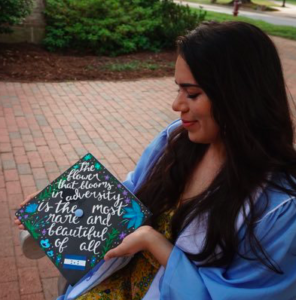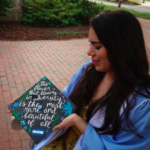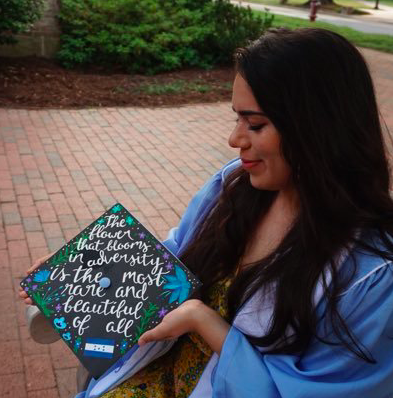 Since Women’s History Month began, I’ve been reflecting on my identity as a cisgender woman. I have been examining the intersections I exist at in terms of my ethnicity, sexuality, and socioeconomic upbringing. As I thought about the narratives that are less popular in published materials, my identity as a Central-American woman came to the forefront of my mind. I want to preface my reflection by saying that I am not an indigenous or Afro-Latinx woman. My identity as a Central-American is one rooted in privilege, especially within the context of being born in and living in the United States. My narrative is valid, but should not be one that is elevated or centered above marginalized communities in Central America.
Since Women’s History Month began, I’ve been reflecting on my identity as a cisgender woman. I have been examining the intersections I exist at in terms of my ethnicity, sexuality, and socioeconomic upbringing. As I thought about the narratives that are less popular in published materials, my identity as a Central-American woman came to the forefront of my mind. I want to preface my reflection by saying that I am not an indigenous or Afro-Latinx woman. My identity as a Central-American is one rooted in privilege, especially within the context of being born in and living in the United States. My narrative is valid, but should not be one that is elevated or centered above marginalized communities in Central America.
While I was born and grew up in the United States, my family is from a small town named Esquías, Honduras. Growing up in a small town in North Carolina, what it meant to be Honduran felt unknown. The identity of what it meant to be Latinx was painted in broad strokes, which left little room for variation in identity and narrative.
As I grew up, I felt a desire to connect. I searched for histories, narratives, and art done by Hondurans. However, a lot of my searches came up sparse. As a university student, I minored in Latinx Studies with the hoping of feeling more grounded and understood in my ethnic identity. While I began to feel increasingly secure, I still had little to no knowledge on Honduran history, popular Honduran figures, and the experience of Hondurans in the United States.
As an undergraduate student, I took a course in the education department that detailed the experience of Mexican-Americans in the educational system. As students, we had the chance to write about our reflection on the material. I remember referring to my own identity as feeling like an invisible limb, one I knew that was present but unseen.
As an adult, I navigate my history more through reflection and understanding the intersections of my identity. While there are still so many aspects of my identity I want to learn, I have connected with the larger Central American community online and have stayed connected to political advocacy and activism in the region. I’ve learned how to be proud of my heritage without centering colonialistic ideals and prioritizing the narratives of indigenous and Black Central Americans. One way I take pride in my identity as a Central American woman is by sharing and honoring the legacy of Berta Cáceres. Cáceres is an indigenous activist who advocated for environmental rights and protections of the Lenca community. Learning about Cáceres and her life has allowed me to feel connected to my identity in ways that I did not have the opportunity to prior.
Through online communities such as Central American Disruption, I have been able to feel connected to my identity by centering the narratives of Central Americans who are often overlooked in the diaspora. As a Central American/Honduran woman specifically, I take great pride in being able to look at women and gender expansive activists and leaders in these digital spaces. Through this growing field, there has been an increase in programs offering Central American studies, where students will have the chance to learn about Central American history, identity, and social movements. While historically I was unable to connect with my heritage in the past, the digital realm has created an array of opportunities for connection.
As I move forward in my life, I think about how being a Honduran woman intersects with the various aspects of my identity. How have the ways I’ve attempted to connect with myself in the past shaped the ways I’m connecting with myself as an adult? I think overall, I feel more secure. I understand that the ways in which pride in my heritage is celebrated in the United States can be exclusionary and colonial, as it prioritizes pride in a colonized nation. However, I understand that there are ways I can take pride in my identity that do not cause harm. As I look forward to the rest of Women’s History Month, I am excited to hear the narratives of those within and outside of my community.
 Jessica J. Mencia (she/her/ella), MSW is a PhD student at the University at Buffalo School of Social Work and an alumni of the University of Chapel Hill. Her research centers on abortion access and sexual rights and risk-taking in marginalized young women and girls. She can be contacted at jjmencia@buffalo.edu.
Jessica J. Mencia (she/her/ella), MSW is a PhD student at the University at Buffalo School of Social Work and an alumni of the University of Chapel Hill. Her research centers on abortion access and sexual rights and risk-taking in marginalized young women and girls. She can be contacted at jjmencia@buffalo.edu.

There are no comments
Add yours